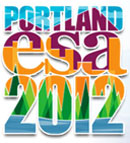Inaugural cross-disciplinary Public Participation in Scientific Research conference gathers at the 97th annual meeting of the Ecological Society of America
Special “Citizen Science” issue of Frontiers in Ecology and the Environment accompanies the event
Media Advisory
For immediate release: 20 July 2012
Contact: Liza Lester (202) 833-8773 x 211; gro.asenull@retsell
Though public participation in scientific research has deep roots in the history of science, in the last few years it has taken off spectacularly from launch pads across the disciplines of science and education, fueled by advances in communications technology and a sea change in a scientific culture now eager to welcome outsiders as collaborators.
Citizen science, crowd-sourced science, DIY research, volunteer monitoring, community participatory action research – the variety of banners flying over participatory science projects reflects the diversity of their origins, from astronomy to zoology. This August, the first cross-disciplinary conference on Public Participation in Scientific Research will bring the clans together as part of the Ecological Society of America’s 2012 annual meeting in Portland, Oregon.
Citizen science projects give non-specialists the power to apply their curiosity about the natural world, and their love of puzzles and games, to real scientific questions. Projects have recruited naturalists and novices to classify galaxies, refine protein models, align DNA sequences, identify and count birds, record weather, and track plant and animal life through the changing of the seasons.
“The participatory science field has been growing, but in isolated silos. Even within the environmental sciences, the water quality people self-organize separately from the biology people,” said Abe Miller- Rushing, one of the meeting organizers, and a science coordinator for the National Park Service. “We really wanted to have an open-invite meeting that emphasized innovation, and could kick-start conversations.”
Miller-Rushing will open the conference with a presentation on the history of public participation in scientific research. He has a paper on the same topic, with Richard Primack of Boston University and Rick Bonney of the Cornell Lab of Ornithology, in the upcoming August 2012 special issue of ESA’s journal Frontiers in Ecology and the Environment, “Citizen Science – new pathways to public involvement in research,” timed to coincide with the conference.
Other invited speakers hail from public health, biochemistry, education, geography, and atmospheric sciences, at universities, government agencies, and indigenous organizations. Organizers expect over 150 poster presentations.
Many participatory science initiatives started with a researcher’s need for additional hands, eyes, and boots on the ground. With the help of dedicated hobbyists, enthusiastic school kids and teachers, and curious on-lookers, they could multiply data collection and analysis by orders of magnitude, essentially creating thousands of lab and field assistants.
Educators and scientific organizations soon saw the potential for learning-through-doing, drawing the practice of science back into public life – from which it has grown increasingly estranged.
Though projects are diverse in style and application, they overlap in their need for large data repositories, attractive user interfaces, sustainable funding and management, connectivity with their volunteers, recruitment, and quality control. The conference offers a chance to cross-pollinate, and share ideas.
“The conference comes at a time when citizen science is gaining significant momentum in advancing scientific knowledge and enhancing science education,” said Sandra Henderson, director of NEON’s Project BudBurst, guest editor for Frontiers’ “Citizen Science” special issue, and an advisor for the Public Participation in Scientific Research conference. “This conference will bring diverse stakeholders together to form new communities that will help citizen science reach its full potential in addressing the needs of science and society.”
The Ecological Society of America’s 2012 annual meeting, Aug. 5-10 in Portland, Oregon, is free for reporters with a recognized press card and institutional press officers. Registration is also waived for current members of the National Association of Science Writers, the Canadian Science Writers Association, the International Science Writers Association and the Society of Environmental Journalists. In a break from previous policy, meeting presentations are not embargoed.
Press interested in attending the Public Participation in Scientific Research conference or other portions of ESA’s annual meeting should contact Liza Lester, gro.asenull@retsell, 202-833-8773 x211.
National Workshop on Public Participation in Scientific Research
Saturday and Sunday, August 4-5, 2012, Oregon Convention Center, Portland
This conference is made possible by the generous support of the S. D. Bechtel, Jr. Foundation. Additional support is provided byNature, the Ecological Society of America, DataONE, and the Association of Science Technology Centers.
Detailed information and schedule available at: http://www.citizenscience.org/community/conference2012/
Workshop contacts:
- Meg Domroese (organizer) moc.liamgnull@1modgem, 917-209-1087
- Abe Rushing-Miller, National Park Service, Acadia National Park and Schoodic Education and Research Center, Bar Harbor, ME, vog.spnnull@gnihsur-rellim_eba, 207-288-8733
- Rick Bonney, Cornell Lab of Ornithology, Cornell University, Ithaca, NY, ude.llenrocnull@5ber
- Jennifer Shirk, CitizenScience.org, Cornell Lab of Ornithology, Ithaca, NY, ude.llenrocnull@322slj
The August issue of ESA’s journal Frontiers in Ecology and the Environment will be devoted to “Citizen Science – new pathways to public involvement in research.” This special issue was underwritten by the National Science Foundation (NSF). This issue will be entirely open access but journalists may contact Liza Lester to access journal content prior to its publication on August 1.
NSF will hold a web-based press briefing for the special issue and conference on Tuesday, July 31, featuring special issue guest editor Sandra Henderson of NEON’s Project BudBurst. For details, contact Lily Whiteman, gro.fsnnull@amtihwL, 703-292-8310.
